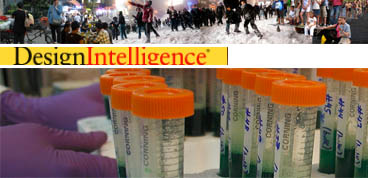 Trust and Knowledge Management. Sustainable Campus Model. Design for Healthier Cities. Uncertainty in Design.
Trust and Knowledge Management. Sustainable Campus Model. Design for Healthier Cities. Uncertainty in Design.
Trust is Essential in Knowledge Management. Andrew Trickett, Global Rail Knowledge & Information Manager at ARUP, writes about the value of creating a work environment of trust to facilitate the sharing of knowledge and cooperation among employees. He stresses that employers should remove barriers from competition and that by taking the time to review both a projects’ accomplishments as well as its short falls, that a company can increase its overall performance and client satisfaction.
If as a group people are sharing, and talking about knowledge through their experiences, then this can be the starting point for people to ask unorthodox questions, experiment with new ideas and ways of working in a safe setting before they expose a creative idea to the organisation.” – Andrew Trickett
A Model for Sustainability on Campus. Many older colleges and universities face outdated and inefficient infrastructure resulting in unsustainable water and energy consumption. Hoping to create a more sustainable campus and lower energy bills, Lynn College in Boca Raton, Florida implemented an innovative Sustainability Management Tool that brought administrators, faculty, students as well as municipal officials and third party consultants together to implement sustainable objectives from the school’s master plan.
Central to the Sustainability Management Tool are:
- A strong organizational structure
- The elimination of “boundaries”
- Partnerships
- Discussion
By reaching out and engaging in discussions with the community, Lynn College was able to reduce their energy consumption and costs dramatically.
Making Cities Healthy Through Design. Kristian Villadsen from Gehl Architects in Copenhagen, Denmark recently spoke at the Netherlands Architecture Institute in Rotterdam about connecting vibrant public spaces through safe biking and walking areas in cities to increase the health of urban dwellers.
In his presentation, he discussed Copenhagen’s many bike lanes, public spaces and in particular the city’s Harbor Bath which is only a mere 700 meters from city hall. In addition, he elaborates on an effective and innovative pilot project in New York City’s Times Square which studied the impacts of increasing public space in dense urban areas.
Uncertainty in Design. In this thought-provoking article by Yale School of Forestry and Environmental Studies graduate student Renee Kaufman, she examines both the philosophical and scientific question of uncertainty in the study and implementation of ecology in landscape design. Hoping to lessen uncertainty and the anxiety it causes, she proposes adaptive management as a means to acquire better and more effective data about a project’s performance after construction.
